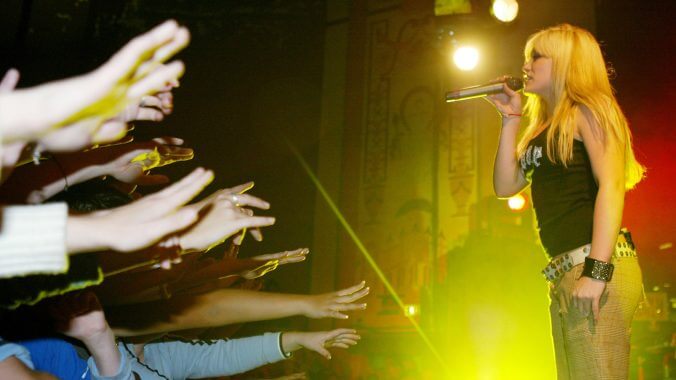Hilary Duff’s Metamorphosis at 20: Reflecting on a Picture of Millennial Adolescence
Photo by J. Shearer/WireImage
Hilary Duff helped an entire generation through the odyssey of growing up. Many of us found a friend in Lizzie McGuire, and Duff’s music added new dimensions to our devotion. August 26 marks the 20th anniversary of her breakout album Metamorphosis, which followed her 2002 holiday record Santa Claus Lane. Released just over a month before her 16th birthday, Metamorphosis represented much of Duff’s lived experience. The album’s title captured pivotal changes we saw in her artistic trajectory—from television actress to musician and feature film star, from Lizzie McGuire to platinum-certified powerhouse.
Duff’s young fans were presented with many prospects while forming identities in their tween years: They could go punk and channel their inner Avril Lavigne, or they could take style cues from the burgeoning reality TV stars of the day and the established pop powerhouses. As a singer, Duff gave them an edgy but approachable role model, a young woman who was candid about trying something new while also remaining confident in her own work ethic and abilities. She was inspired by the teen artists in her Hollywood circle. The former senior VP of A&R at Walt Disney Records, Jay Landers, saw her synergistic potential.
With the right collaborators on board, Hilary Duff helped redefine Disney Channel stardom. Her contemporary, Raven-Symoné, had a full music career before working with Disney and lending her voice to The Cheetah Girls. The Jonas Brothers were even signed to Columbia Records before becoming affiliated with Hollywood Records and Disney Channel. It was totally new for someone to start a music career on Disney’s record labels from the foundation of starring in a Disney Channel series. Selena Gomez, Miley Cyrus and Demi Lovato have all expressed their admiration for Duff, as she walked a path worth studying and made it to the other side of child stardom without the public trials that some of her peers faced. Metamorphosis, in retrospect, changed her life and shaped the musical tastes of a generation.
She worked with sought-after producers The Matrix (Lauren Christy, Scott Spock and Graham Edwards)—who wrote “So Yesterday,” “The Math” and “Where Did I Go Right?” with Charlie Midnight. Lavigne had worked with The Matrix on “Complicated,” “Sk8er Boi,” “I’m With You,” “Anything But Ordinary” and “Things I’ll Never Say” for her debut record Let Go—so Duff and the trio made complete sense.
I still have my original copy of Metamorphosis, which spun in my boombox as I sang along to “So Yesterday” at age nine. Now, at 29, the message is no less comforting and can still be applied to life in general, not just a breakup: “Laugh it off, let it go, and when you wake up it will seem so yesterday, so yesterday.” This guitar-driven lead single set up Duff’s pop-rock sound and look, making it easy for us to sing along and nail those spoken bits: “You can change your life—if you wanna / You can change your clothes—if you wanna.” She wears jeans and a black top and blazer in the music video (directed by Chris Applebaum), complete with a single black glove. As vivid as that image is, her next single is ingrained as much, if not more, in the collective millennial consciousness.
From its hypnotic synth pattern to its angsty chorus, “Come Clean”—written by Kara DioGuardi and John Shanks—was perhaps one of the most serious songs Hilary Duff’s fanbase would encounter in 2003. Though it was reflective of DioGuardi’s journey as a songwriter, “Come Clean” was adapted for Duff and fit the singer’s goal of sharing who she really was. “I’m shedding / Shedding every color / Trying to find a pigment of truth / Beneath my skin,” she sings. An abridged version of the music video (directed by Dave Meyers) played on Disney Channel—with Duff in a white sweater, surrounded by candles as the rain pours—while the MTV crowd heard the song as the intro to Laguna Beach. There’s no better music for plumbing the depths of the soul. The chant-like interlude of “rain fall down” and “let the rain fall” has a cleansing quality before Duff again pleads, “Let it wash away / My sanity / ‘Cause I wanna feel the thunder / I wanna scream / Let the rain fall down / I’m coming clean.” Each note in the chorus is well-placed, rising with “let the rain” and descending to “fall down.”
I view “Little Voice” and “Party Up” as companion songs. The former, written by DioGuardi and Patrik Berger, was originally sung by Swedish artist Sahlene but with much more suggestive lyrics. A hint of this remains in Duff’s second verse: “You smell so sweet just like my perfume / What have you been doing since I left you?” The production style from DioGuardi and Chico Bennett is playful, and Duff’s half-step intervals create instability approaching the tonal center of the chorus. “The little voice in my head just won’t let me get with you,” she concludes. “Party Up,” written by Meredith Brooks, Taylor Rhodes and Ashley Hamilton, instead has her accept a tumultuous romance. “You roll me, you use me, you love me and then / You wrap me up and reel me in and use me again / You love me, you hate me, you say it’s the end / I know you’re gonna do it again and again,” she speak-sings in the bridge, leading up to a dramatic, climactic vocal slide.
-

-

-

-

-

-

-

-

-

-

-

-

-

-

-

-

-

-

-

-

-

-

-

-

-

-

-

-

-

-

-

-

-

-

-

-

-

-

-

-








































